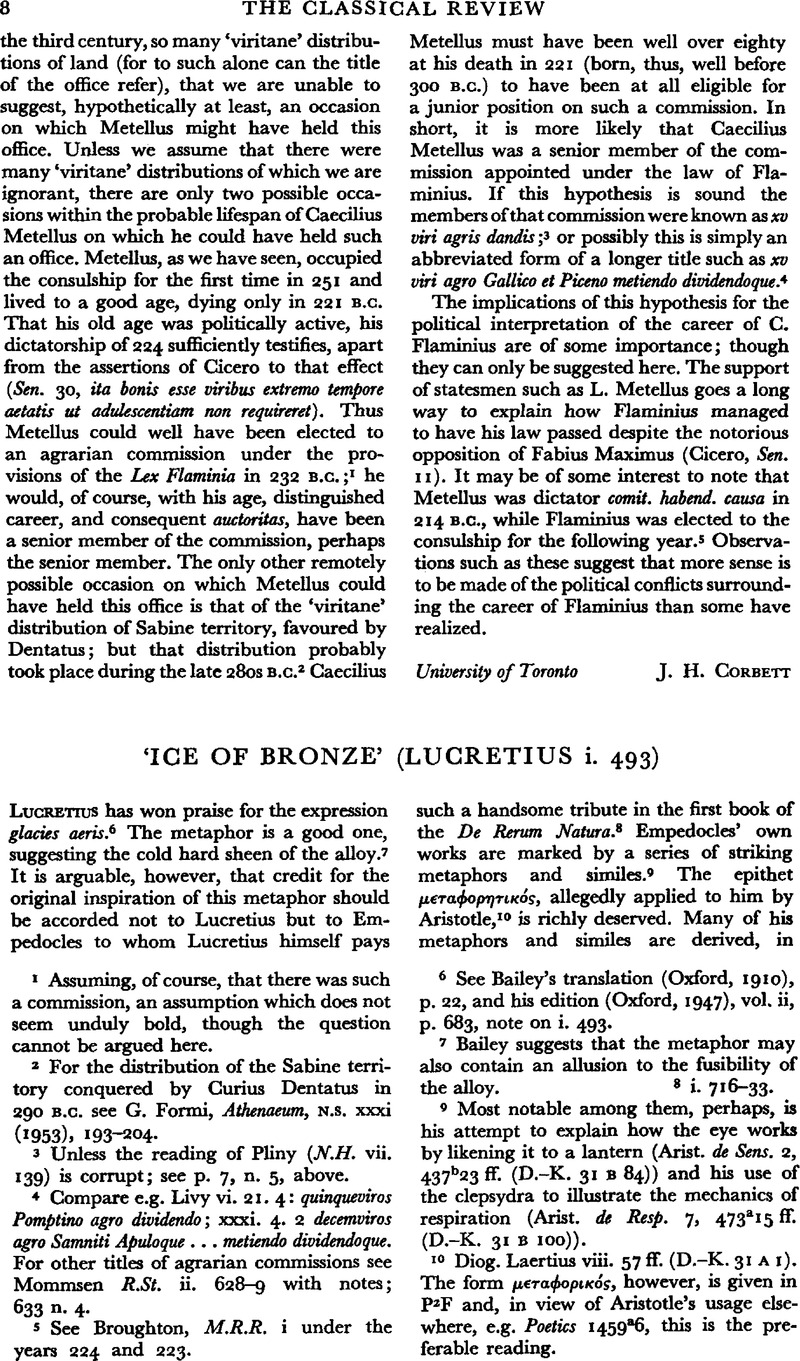Article contents
‘Ice of Bronze’ (Lucretius i. 493)
Published online by Cambridge University Press: 27 February 2009
Abstract

- Type
- Review Article
- Information
- Copyright
- Copyright © The Classical Association 1970
References
page 8 note 6 See Bailey's translation (Oxford, 1910), p. 22, and his edition (Oxford, 1947), vol. ii, p. 683, note on i. 493.
page 8 note 7 Bailey suggests that the metaphor may also contain an allusion to the fusibility of the alloy.
page 8 note 8 i. 716–33.
page 8 note 9 Most notable among them, perhaps, is his attempt to explain how the eye works by likening it to a lantern (Arist. de Sens. 2, 437b23 ff. (D.-K. 31 B 84)) and his use of the clepsydra to illustrate the mechanics of respiration (Arist. de Resp. 7, 473a15 ff. (D.-K. 31 B 100)).
page 8 note 10 Diog. Laertius viii. 57 ff. (D.-K. 31 A 1). The form μεταϕορικ⋯ς, however, is given in P2F and, in view of Aristotle's usage elsewhere, e.g. Poetics 1459a6, this is the preferable reading.
page 9 note 1 Bignone, however, has persuasively urged that fr. 73 should be joined to fr. 34 to form a simile derived from baking; Empedocles (Turin, 1916), p. 427.
page 9 note 2 According to Aristotle (de Gen. An. B 8 747a34 (D.-K. 31 A 92)) the reason he gave was that though the semen of both horse and ass is soft their mixture solidifies as the ‘hollows’ of each fit into the dense parts of the other. As a result of this kind of mixture soft bodies become hard just as when copper is alloyed with tin.
page 9 note 3 ii. 11. 2: cf., too, Achilles, Is. 5, p. 34, 29M. and Lactantius, De Opif. Dei 17. 6 (D.-K. 31 A 51).
page 9 note 4 Ps.-Plut. Strom, ap. Eus. P.E. i. 8. 10 (D.-K. 31 A 30).
page 9 note 5 de Prov. ii. 61 p. 86 (D.-K. 31 A 66).
page 9 note 6 C.Q., lix (1965), 249–51.
page 9 note 7 For further evidence of this solidifying activity of fire in Empedocles cf. [Arist.] Problems 24. 11. 937a11 and Plutarch, de prim. frig. 19. 4, p. 953e (D.-K. 31 A 69).
page 9 note 8 vi. 1083–6; cf. note 2, above. For other instances of Lucretius' poetic debt to Empedoclers see especially Hallier, A., Lucreti Carmina e Fragmentis Empedoclis Adumbrata, Diss. Jena, 1857Google Scholar; Jobst, F., Über das Verhältnis zwischen Lukretius und Empedokles, Diss. Munich, 1907Google Scholar; and Kranz, W., ‘Lukrez und Empedokles’, Philologus. xcvi (1943), 68–107.Google Scholar
- 1
- Cited by


